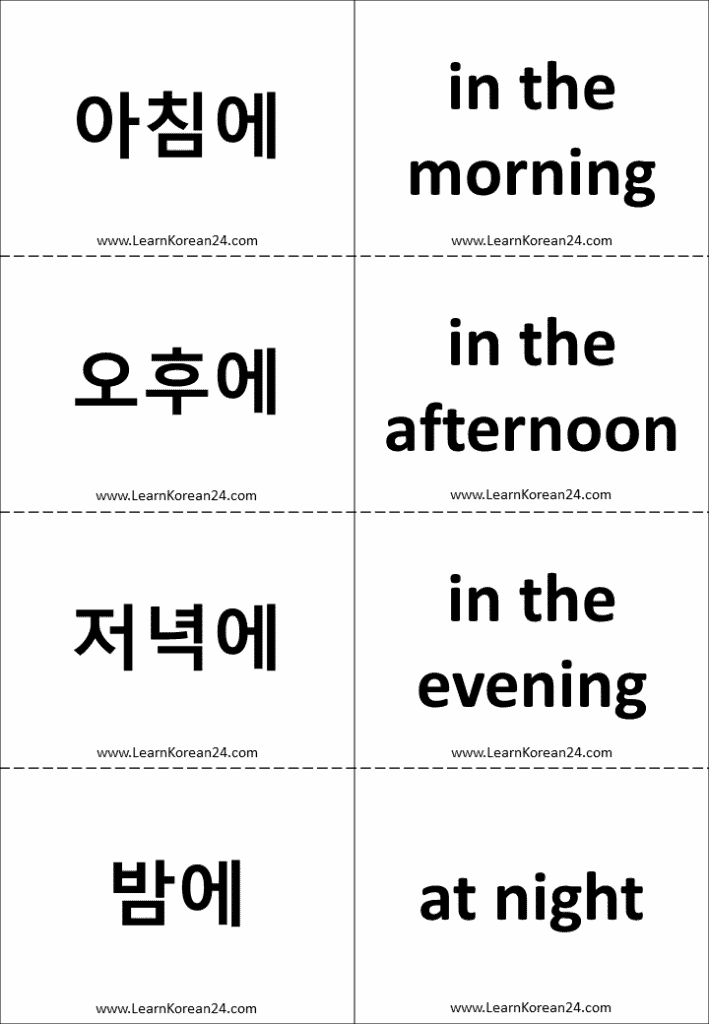How To Say “When” In Korean – 언제
In this lesson, you will learn how to say when in Korean. In English, the word ‘when’ is used in both questions (e.g. “When did you arrive?”) and in statements (e.g. “When you arrive, I’ll start cooking.”). However, in Korean, the word for ‘when’ is different depending on whether you’re asking a question or making a statement.
In this lesson, we will just focus on ‘when’ as a question word in Korean. You will learn how to make questions using ‘when’ in Korean, plus some useful words about times of the day, so that you can answer these questions in Korean. So, what is ‘when’ in Korean?
When in Korean is 언제 [eon-je]. 언제 can be used to make questions in Korean about what time something happened. For example, “언제 도착했어요?” [eon-je do-chak-hae-sseo-yo?] (When did you arrive?).
Making Questions With When In Korean
To make a question with ‘when’ in Korean, you simply place 언제 in front of the verb/action you are enquiring about. For example, if you want to ask “When do you get up?”, you simply place 언제 before the verb ‘get up’ (일어나다) in the question.
Example:
언제 일어나요? = When do you get up?
As you can see, in the above example, the sentence is in the present tense. In English and Korean, when asking about what time something usually happens, you would use the present tense.
If you want to ask about when something happened in the past, you simply change the verb in the question to the past tense. If you need to review how to conjugate verbs in the past tense, check out our lesson on the past tense in Korean.
Example:
언제 일어났어요? = When did you wake up?
If you want to ask about when something will happen in the future, you can change the verb into the future tense. Check out our lesson on the future tense in Korean to review how to do this.
Example:
내일 언제 일어날 거예요? = Tomorrow, when will you wake up?
Please note that, although you can make questions about when something will happen in the future by changing the verb into the future tense, it is also common in Korean to simply use the present tense when asking about when something will happen in the future. Especially if it is already clear that you are talking about something in the future.
For example, the question “내일 언제 일어날 거예요?” (Tomorrow, when will you get up?), includes the word 내일 (tomorrow) so it is already clear that you are talking about the future. So, it is perfectly okay to use the present tense and say “내일 언제 일어나요?” (Literally, ‘Tomorrow when get up?”).
Example Questions:
Here are some more example questions with ‘when’ in Korean:
| English | Korean | Listen |
|---|---|---|
| 언제예요? | 언제예요? | |
| When did you do (it)? | 언제 했어요? | |
| When did you come? | 언제 왔어요? | |
| When did you arrive? | 언제 도착했어요? | |
| When do you eat lunch? | 점심을 언제 먹어요? | |
| When did you wake up this morning? | 아침에 언제 일어났어요? | |
| When will you do (it)? | 언제 할 거예요? | |
| When will you sleep? | 언제 잘 거예요? |
Answering When In Korean
Here are some useful words about ‘times of the day’ in Korean that you can use to answer ‘when’ questions in Korean:
- 어제 [eo-je] = yesterday
- 내일 [nae-il]= tomorrow
- 오늘 [o-neul] = today
- 방금 [bang-geum] = just now
- 지금 [ji-geum] = now
- 아까 [a-kka] = earlier today
- 아침에 [a-chim-e] = in the morning
- 오후에 [o-hu-e] = in the afternoon
- 저녁에 [jeo-nyeo-ke] = in the evening
- 밤에 [bam-e] = at night
- 나중에 [na-jung-e] = later
- 후에 [hu-e]= after
Download Flashcards
To help you learn these words, you can download these printable flashcards for free.

STUDY ONLINE WITH KOREAN ARAH!
Ready to take your Korean to the next level?
Get One-on-One Korean lessons from a qualified and experienced Korean language tutor!

